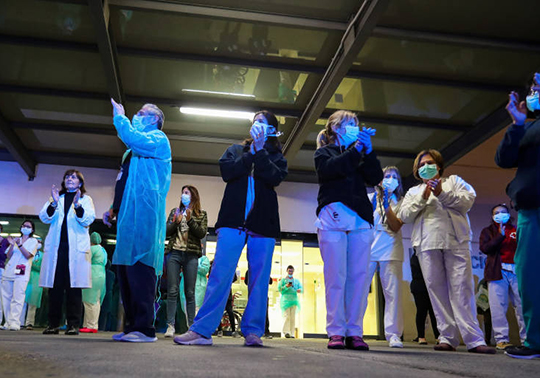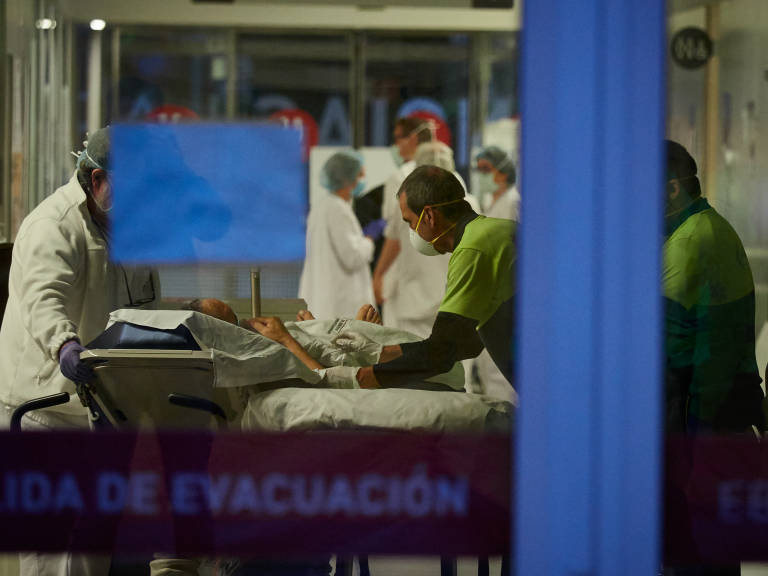
The defence of the constitutional order is carried out through mechanisms provided for in the Constitution itself. The ordinary ones are applied in periods of normality, through the control of the actions of the public authorities, while the extraordinary ones are applied in situations of constitutional abnormality and therefore may compromise or limit rights, as is the case of the declaration of states of alarm, emergency and siege provided for in article 116 of the Spanish Constitution.
The defence of the constitutional order is carried out through mechanisms provided for in the Constitution itself. The ordinary ones are applied in periods of normality, through the control of the actions of the public authorities, while the extraordinary ones are applied in situations of constitutional abnormality and therefore may compromise or limit rights, as is the case of the declaration of states of alarm, emergency and siege provided for in article 116 of the Spanish Constitution.
We are living in a confinement that responds to the measures decreed by the Spanish Government in view of the declaration of the state of alarm due to the health crisis in Covid-19, which according to the Professor of Constitutional Law, Remedio Sánchez Ferriz, could be closer to the state of emergency if we analyse the effects it is having, since not only the suspension of public freedoms, such as movement and circulation or others of an economic nature are closer to a state of emergency but also other very personal rights linked to death itself or that of the people closest to it.
On the other hand, the normal functioning of the institutions essential for the maintenance of democratic normality would also be in danger, as other constitutionalist experts also point out. In recent statements, the former judge of the Spanish Constitutional Court, Manuel Aragón, said that the control of the executive is absolutely indispensable in parliamentary democracy, which can be perfectly adapted to the measures of protection and security that the situation deserves, "but it cannot be interrupted nor disappear", as other constitutionalist experts also claim. Among these, Vicente Garrido Mayol also considers that although the limitation of rights that we are suffering from is appropriate for the current state of alarm, the obligation of confinement outside the home would not be, and he adds that it can also be considered that, de facto, the rights of assembly and demonstration are also suspended. To these limitations of rights, we must add those that may arise from the order for the development of an application that will allow the geolocation of the user.
In short, we can see that there are compromised rights affected by the declaration of a state of alarm and they all have to do with freedom and basic principles of democracy. However, the sacrifice of freedom is justified by the protection of people's right to health, and by the defence of health security, and this makes us must consider up two legitimate interests in conflict, which weighs more heavily?
Geraldine Schwarz said a few days ago that she never thought that "in our time people would give up freedom like this for security". Between the classic disjunctive of freedom vs. security, in this case health security, the author wonders if it is enough of a threat to make way for giving up freedom, and if the threat to the former is disproportionate to the limitation of the latter.
Not only jurists, but also other academics discuss the risk of confinement not only for personal freedom but for the normal development of democratic institutions and therefore for the survival of democracy itself. Professor of Psychiatry Rafael Tabarés reflected on which would prevail in the face of this crisis, the protection of the human species or that of democracy, and responded that it would undoubtedly be the former over the latter, thus warning of the risk to democracy. Neither do I have any doubts about which should prevail, but I also believe that making the protection of people's health and safety prevail does not have to endanger democracy. In order to understand this, we need to analyse the concept of democracy that we are starting from in a context of a social state governed by the rule of law that advocates the value of justice and equality as fundamental values alongside that of freedom.
If we understand the meaning of the measure and are aware that the sacrifice involved in renouncing freedom contributes to a common good from a new ethic of solidarity that should inspire the constitutional order and be another value to be included in our Constitution, which also upholds the value of justice, then it is understood that there is no reason to think that the option of protecting people and their security could endanger democracy because, in addition, strengthening the protection of people is also a guarantee for it.
By giving up part of our freedom on a provisional basis in a period of constitutional abnormality in pursuit of solidarity, we are also carrying out a democratic exercise. We are carrying out the democratic exercise of not falling ill so as not to collapse hospitals saturated by the devastating effects of a pandemic which, although it could have been anticipated by looking at the antecedents in other countries, would have happened anyway and which we must tackle with all the means at our disposal. We are also carrying out a democratic exercise by restoring the value of care to the apex of those values, which would result from that ethic of solidarity.
It is essential to direct efforts to change our scale of values. What is worth more, what matters more? Of course, life, putting people and those who care for them at the centre must be the meaning of politics. For this we need an epic of care, as Irene Vallejo called for. We already know what the ethics of care consists of, and now we need to build an epic of care that points out who the real heroes and heroines are now.
In recent statements Alain Touraine said that "we are entering a new type of society, the society of services, but of services among humans. This crisis will push up the category of carers: they can no longer be underpaid". We must add the importance of "generalising" the group of caregivers, because it is well known that most of them are women, who are the ones who are usually supporting the care at home and in public spaces. In fact, Touraine proposes as one of the fundamental decisions for Europe "the liberation through women, that is to say, the collapse of reason at the centre of personality and the recompositing of affections around reason and communication, a society of care". In other words, to propose a new model of social and democratic state that prioritises care.
As Katrine Marçal puts it, if care for people is to be preserved in our society, it must take a central role and must be supported with the necessary economic resources. In this way, other essential goods for the economy will be recovered, not only the productive ones should count but also the reproductive ones, only in this way can the different democratic values be reconciled.
This article was originally published in Valencia Plaza
Images:




